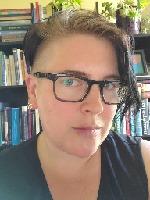Sara K Janes is an Archivist at Lakehead University.
Local and regional archival collections are a key part of the worldwide archival network. Living and working in Thunder Bay, ON, which is a four-hour drive from the nearest city of comparable size, has taught me just how important local heritage collections are to the people who create them and the people who use them. If our national and provincial archives are a plane ride away, we can’t reasonably ask those institutions to take responsibility for our local history.
I work as the Archivist for Lakehead University; the archives (https://archives.lakeheadu.ca/) is but one room and 1.5 FTE, so I have responsibility for most things, and digital preservation is only one aspect of my work. We’ve thus benefited enormously from taking part in Scholars Portal, a set of services provided through the Ontario Council of University Libraries. One of those services is Permafrost (https://permafrost.scholarsportal.info/), which provides reliable storage and a hosted Archivematica instance. Accessing these tools as a service hosted elsewhere, and with excellent support provided by Scholars Portal, makes it possible for an archivist without a strong tech background to carry out meaningful digital preservation work.
The positive impact of this work on donors of records, who are reassured that their collections can be preserved reliably by a local institution, is priceless. In the past few years I’ve acquired collections with significant digital components, and it wouldn’t have been right to do so without this confidence that I can process them appropriately and keep them accessible for the future.
These born-digital collections include the results of a digital storytelling workshop with local seniors, capturing their viewpoints on life in Thunder Bay over the years. It includes the records of a former Member of Parliament, who was also a personal friend before his too-soon death last year. It includes records from an early activist for HIV/AIDS and LGBTQ+ rights in Northwestern Ontario, including recordings of the Thunder Gay Magazine public access TV program. (We’ve also been digitizing the recordings still on cassette, although that work has been on hold in recent months.)
Just this year, I’ve begun work to capture and preserve evidence of our local health and government institutions responding to the COVID-19 pandemic. Some of that takes the form of Archive-It and Webrecorder website and social media captures. I’ve also been packaging video information created for the public by the local hospital and by the City, and shared on YouTube, and preserving this in Permafrost. While hospital records are a provincial responsibility, this public messaging is of significant local interest, and the YouTube videos seem a transitory enough medium that may not be available in the medium or long term, that I’ve decided to bring them into our repository with the hospital’s assent.
I could not in good conscience leave these files on a USB drive in a box somewhere, and feel as though I was doing these histories justice. Even though the digital preservation work I do is far from the cutting edge, it’s providing a real benefit to local researchers, and to the creators of these records. Those real benefits are what my work in local preservation, both digital and physical, is all about. The work of digital preservation has to include supporting and providing tools for smaller local and regional institutions, so all these diverse histories can be preserved and made available equally.
